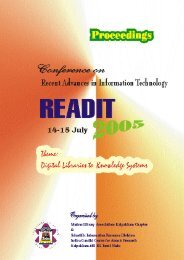READIT-2007 - Indira Gandhi Centre for Atomic Research
READIT-2007 - Indira Gandhi Centre for Atomic Research
READIT-2007 - Indira Gandhi Centre for Atomic Research
Create successful ePaper yourself
Turn your PDF publications into a flip-book with our unique Google optimized e-Paper software.
KNOWLEDGE MANAGEMENT IN DIGITAL<br />
INFORMATION SYSTEM AND THE ROLE OF LIBRARY<br />
AND INFORMATION CENTRES WITH SPECIAL<br />
REFERENCE TO INDIA<br />
Subarna K. Das *<br />
Knowledge management is emerging as a key concern of organizations, particularly those<br />
who have already redesigned their business processes and embedded a total quality approach into<br />
their practices. Knowledge management may mean management of knowledge, both explicit and tacit<br />
knowledge. Knowledge Management provides access to experience, knowledge and expertise that<br />
create new capabilities, enable superior per<strong>for</strong>mance, encourage innovation, and enhance customer<br />
value. Present paper attempt to highlights the growth and development of knowledge management in<br />
the changing context of digital environment as well as current and common challenges in knowledge<br />
management and its probable solution as well as role of library and in<strong>for</strong>mation professionals<br />
Keywords: In<strong>for</strong>mation, Knowledge, Knowledge Management, Digital Environment, Common<br />
Challenges, and Knowledge Management Solutions<br />
1. KNOWLEDGE MANAGEMENT: GROWTH AND DEVELOPMENT<br />
Knowledge economy is a knowledge-based economy. In the knowledge<br />
economy era, the management refers to effectively identify, acquire, develop, resolve,<br />
use, store and share knowledge, to create an approach to trans<strong>for</strong>ming and sharing of<br />
tacit and explicit knowledge, and to raise the emergency and innovation capability by<br />
utilizing the wisdom of the team. Since knowledge has become the driving <strong>for</strong>ce <strong>for</strong><br />
social development, the attention of the society to in<strong>for</strong>mation and knowledge is<br />
rising and people's demands <strong>for</strong> in<strong>for</strong>mation and knowledge are increasing step by<br />
step. This has provided a good environment <strong>for</strong> library development. Moreover, as<br />
in<strong>for</strong>mation and knowledge has become an important productive factor <strong>for</strong> the<br />
modern economic system, the society will inevitably require intensified management<br />
of in<strong>for</strong>mation and knowledge. How to manage knowledge will become an important<br />
subject facing libraries in the near future. Knowledge management in libraries should<br />
be focused on effective research and development of knowledge, creation of<br />
knowledge bases, exchange and sharing of knowledge between library staffs<br />
(including its users), training of library staff, speeding up explicit processing of the<br />
implicit knowledge and realizing of its sharing. KM has emerged today as a<br />
multidisciplinary subject. As a discipline , it draws from a broad spectrum of<br />
disciplines and technologies such as follows:<br />
1. Cognitive Science, which provides insight into learning and knowing that<br />
ultimately helps in improving the tool and technique <strong>for</strong> gathering and<br />
transferring knowledge.<br />
2. Artificial Intelligence and Expert Systems which help in automating the<br />
process of cognition.<br />
3. LIS which has a rich body of research and practice to contribute to KM<br />
4. Organizational Science which explicitly deal with the need to manage<br />
knowledge[3]<br />
* Sr. Lecturer, Dept. of Library and In<strong>for</strong>mation Science, Jadavpur University, Kolkata-700032<br />
E-Mail: skd_ju2002@yahoo.co.in<br />
22

















